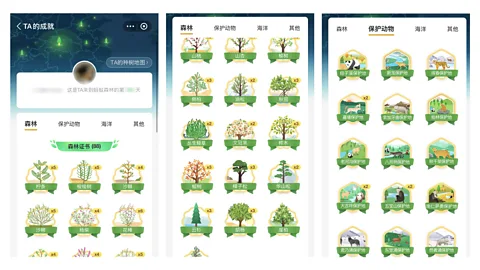A groundbreaking Chinese mobile application designed to promote environmental consciousness through gamification has become the center of controversy as widespread cheating and point manipulation threaten to undermine its green initiatives. Ant Forest, integrated into the world’s largest online payment platform Alipay, has attracted scrutiny as users employ increasingly sophisticated methods to circumvent its eco-friendly intentions.
The app, which boasts 700 million users, was conceived as an innovative approach to environmental conservation, allowing players to earn “green energy points” through environmentally responsible activities such as cycling to work or choosing sustainable products. These points contribute to growing virtual trees, which Ant Group, the app’s developer, translates into real-world tree planting initiatives. The company claims each point represents one gram of reduced carbon emissions.
However, an investigation has revealed a thriving underground economy of users manipulating the system through various means. Some players have resorted to purchasing specialized devices that automatically swing their phones to simulate walking, while others pay for “watering services” or participate in organized point-farming groups. The scope of these activities raises serious questions about the authenticity of the app’s reported environmental impact.
One such user, Li Yulan, a 64-year-old retiree who spoke under a pseudonym, admitted to operating three additional phones to water trees for her primary account and using a phone-swinging device to generate fake step counts. Usually, after shaking it for over two hours, I can get over 18,000 steps,” Li revealed, acknowledging her addiction to the competitive aspects of the game despite recognizing that such behavior contradicts its environmental purpose.
The problem extends beyond individual users to organized groups facilitating systematic cheating. Zhishanlin, which presents itself as China’s largest “voluntary co-planting organisation for public welfare,” has approximately 150,000 members and openly shares tips for gaming the system. These strategies include creating multiple accounts and using automatic step-counting apps, demonstrating the sophisticated nature of the cheating ecosystem.
Ant Group’s response to these challenges has been mixed. Wang Xiaoying, head of the Ant Forest programme, acknowledged the issues while emphasizing the company’s efforts to combat misuse. The company has blocked 26,000 accounts for violations and taken legal action when necessary. However, with the platform’s massive scale, preventing all instances of cheating has proven challenging.
The manipulation of the system raises broader questions about the effectiveness of gamification in promoting genuine environmental awareness and behavioral change. While some research suggests positive outcomes, such as a 648% increase in users declining disposable cutlery when incentivized with Ant Forest points, experts remain skeptical about the long-term impact on sustainable behavior.
Critics argue that the app’s fundamental design may actually hinder environmental consciousness. Zeng Zhen, a doctoral researcher at the University of Helsinki, points out a “clear contradiction” between the app’s environmental goals and its business model, which encourages increased consumption through Alibaba’s ecosystem. The platform’s approach to environmental issues has been criticized for oversimplifying complex environmental challenges and promoting the misconception that consumption can be offset simply through tree-planting initiatives.
The controversy surrounding Ant Forest reflects a larger debate about the role of technology in addressing climate change. While the app has contributed to the planting of 548 million trees and established 34 public conservation areas since 2016, questions persist about the longevity and suitability of these environmental initiatives. Some experts argue that many constructed forests fail to survive and may contribute to water scarcity.
Despite these challenges, some researchers maintain optimism about the platform’s potential. Qingyu Zhang, a professor at Shenzhen University, suggests that while cheating is inevitable in gaming technologies, the positive effects of Ant Forest may still outweigh the negative impacts if the majority of users engage with the platform as intended.
The situation highlights the complex relationship between technological solutions and environmental action. As companies increasingly turn to gamification to promote sustainable behavior, Ant Forest’s experience serves as both a warning and a lesson about the challenges of maintaining integrity in digital environmental initiatives. The ongoing struggle between genuine environmental impact and user manipulation underscores the need for more robust systems that can effectively promote sustainable behavior while resisting exploitation.
As environmental consciousness continues to grow globally, the future success of similar initiatives may depend on finding better ways to align user incentives with genuine environmental benefits, while implementing more effective measures to prevent system manipulation. The Ant Forest case demonstrates that while technology can play a crucial role in promoting environmental awareness, ensuring the authenticity of such efforts remains a significant challenge.
















Add Comment